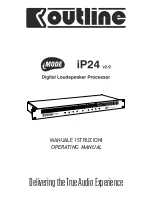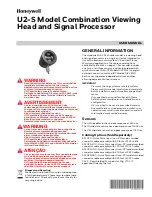
1-16
DSP56309UM/D MOTOROLA
DSP56309 Overview
DSP56309 Architecture Overview
1.10.2
Host Interface (HI08)
The HI08 is a byte-wide, full-duplex, double-buffered, parallel port that can connect
directly to the data bus of a host processor. The HI08 supports a variety of buses and
connects to a number of industry-standard DSPs, microcomputers, and microprocessors
without requiring additional logic.
The DSP core treats the HI08 as a memory-mapped peripheral occupying eight 24-bit
words in data memory space. The DSP can use the HI08 as a memory-mapped
peripheral, using either standard polled or interrupt programming techniques. Separate
transmit and receive data registers are double-buffered to allow the DSP and host
processor to transfer data efficiently at high speed. Memory mapping allows DSP core
communication with the HI08 registers using standard instructions and addressing
modes.
1.10.3
Enhanced Synchronous Serial Interface (ESSI)
On the DSP56309 are two independent and identical ESSIs. Each ESSI has a full-duplex
serial port for communication with a variety of serial devices, including one or more
industry-standard codecs, other DSPs, microprocessors, and peripherals that implement
the Motorola SPI. The ESSI consists of independent transmitter and receiver sections and
a common ESSI clock generator.
The capabilities of the ESSI include the following:
¥ Independent (asynchronous) or shared (synchronous) transmit and receive
sections with separate or shared internal/external clocks and frame syncs
¥ Normal mode operation using frame sync
¥ Network mode operation with as many as 32 time slots
¥ Programmable word length (8, 12, or 16 bits)
¥ Program options for frame synchronization and clock generation
¥ One receiver and three transmitters per ESSI allows six-channel home theater
1.10.4
Serial Communications Interface (SCI)
The DSP56309Õs SCI provides a full-duplex port for serial communication with other
DSPs, microprocessors, or peripherals such as modems. The SCI interfaces without
Summary of Contents for DSP56309
Page 25: ...xxii DSP56309UM D MOTOROLA Figure D 25 Port E Registers PCRE PRRE PDRE D 39 ...
Page 30: ...MOTOROLA DSP56309UM D 1 1 SECTION 1 DSP56309 OVERVIEW ...
Page 47: ...1 18 DSP56309UM D MOTOROLA DSP56309 Overview DSP56309 Architecture Overview ...
Page 48: ...MOTOROLA DSP56309UM D 2 1 SECTION 2 SIGNAL CONNECTION DESCRIPTIONS ...
Page 85: ...2 38 DSP56309UM D MOTOROLA Signal Connection Descriptions OnCE JTAG Interface ...
Page 86: ...MOTOROLA DSP56309UM D 3 1 SECTION 3 MEMORY CONFIGURATION ...
Page 104: ...MOTOROLA DSP56309UM D 4 1 SECTION 4 CORE CONFIGURATION ...
Page 124: ...MOTOROLA DSP56309UM D 5 1 SECTION 5 GENERAL PURPOSE I O ...
Page 125: ...5 2 DSP56309UM D MOTOROLA General Purpose I O 5 1 INTRODUCTION 5 3 5 2 PROGRAMMING MODEL 5 3 ...
Page 128: ...MOTOROLA DSP56309UM D 6 1 SECTION 6 HOST INTERFACE HI08 ...
Page 166: ...MOTOROLA DSP56309UM D 7 1 SECTION 7 ENHANCED SYNCHRONOUS SERIAL INTERFACE ESSI ...
Page 212: ...MOTOROLA DSP56309UM D 8 1 SECTION 8 SERIAL COMMUNICATION INTERFACE SCI ...
Page 241: ...8 30 DSP56309UM D MOTOROLA Serial Communication Interface SCI GPIO Signals and Registers ...
Page 242: ...MOTOROLA DSP56309UM D 9 1 SECTION 9 TRIPLE TIMER MODULE ...
Page 269: ...9 28 DSP56309UM D MOTOROLA Triple Timer Module Timer Operational Modes ...
Page 270: ...MOTOROLA DSP56309UM D 10 1 SECTION 10 ON CHIP EMULATION MODULE ...
Page 302: ...MOTOROLA DSP56309UM D 11 1 SECTION 11 JTAG PORT ...
Page 369: ...C 22 DSP56309UM D MOTOROLA DSP56309 BSDL Listing ...
Page 370: ...MOTOROLA DSP56309UM D D 1 APPENDIX D PROGRAMMING REFERENCE ...
Page 405: ......
Page 409: ......
















































